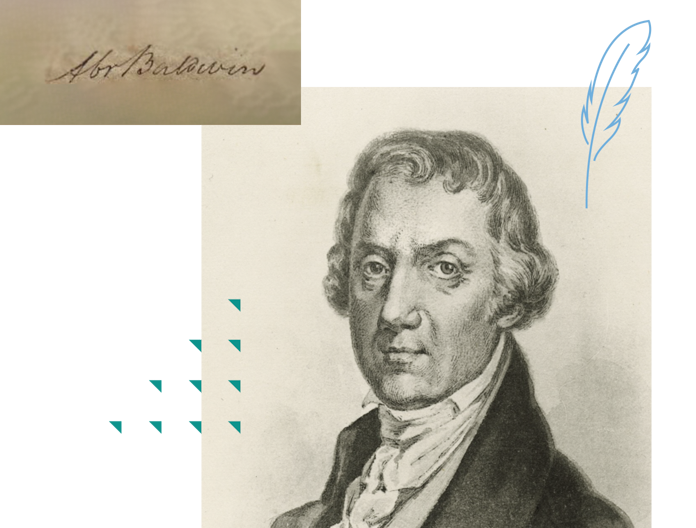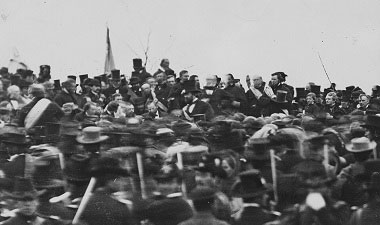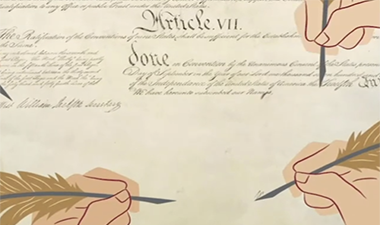Summary
Abraham Baldwin represented Georgia at the Constitutional Convention in 1787, and he helped resolve the controversy over large state versus small state representation in the new government.
Abraham Baldwin | Signer of the Constitution
2:43
Biography
Born in Guilford, Connecticut in 1754, Abraham Baldwin was the second son of a blacksmith who fathered a dozen children by two wives. Baldwin’s father had high aspirations for his sons and daughters and went into considerable debt in order to provide them all with good educations. Abraham was admitted to Yale and graduated in 1772. Soon afterward, he became a minister and returned to the college as a tutor.
But in 1779, as the struggle for independence raged, he joined the Continental Army as a chaplain. After the war, he chose a new career path, the law, and by 1783, he had been admitted to the Connecticut bar.
Shortly after his certification as a lawyer, Baldwin left Connecticut and settled in Georgia. He received permission to practice law in this Southern colony and obtained a land grant in Wilkes County. By 1785, he held a seat in the state assembly and was a delegate to the Confederation Congress. Two years later, his father died and Abraham Baldwin shouldered the debts the blacksmith had incurred and took on the responsibility to pay for the education of Baldwin’s young half-brothers and sisters. Baldwin’s belief in the importance of education would later lead him to be one of the founders of the University of Georgia.
In 1787, Baldwin also became a delegate to the Constitutional Convention. His fellow Georgia delegate, William Pierce, thought highly of the 33-year old Baldwin. Baldwin was, Pierce wrote, “a Gentleman of superior abilities, and joins in a public debate with great art and eloquence. Having laid the foundation of a compleat (sic) classical education at Harvard College, he pursues every other study with ease. He is well acquainted with Books and Characters, and has an accomodating turn of mind, which enables him to gain the confidence of Men, and to understand them. He is a practising Attorney in Georgia, and has been twice a Member of Congress. Mr. Baldwin is about 38 years of age.” Pierce got both his subject’s alma mater and age wrong, but this did not detract from his evaluation of Baldwin as a well-educated intellectual and an eloquent public speaker.
Despite his talents, Baldwin kept a low profile in the Convention’s debates. Yet, he managed to play a significant role in resolving the large state-small state representation controversy. He began with the assumption that representation in the Senate ought to be based on property holding, but came to support the small state demand that Senators should represent their state. It has been speculated that Baldwin came to this position out of fear that the small states would bolt the Convention if population determined the makeup of the Upper House. In the end, he would help draw up the Great Compromise.
The varied proposals put forward during the debates sometimes amazed and amused Baldwin. Writing to Joel Barlow on July 6, Baldwin declared that “the conjectures of people on the great political subjects now before the convention are very various and not a little amusing. So many forms of government I believe never were contrived before. They are floating about here in all directions like Spectators worlds, some half-finished, some a quarter the great part, but just begun—meer political tadpoles.”
Of the six men Georgia sent to the Convention, only Baldwin and William Few continued to serve until the Convention adjourned. Thus, they were the only Georgians who signed the Constitution. Years later, when Baldwin was in the Senate, he would recall a walk with George Washington soon after the Convention finished its work. Washington, Baldwin said, confided that he did not expect the Constitution would exist more than 20 years, but, as a man and as a delegate from Virginia, he approved of it.
Baldwin went on to serve in the U.S. Congress for 18 years, first in the House and later in the Senate. There, he proved a steady supporter of James Madison and Thomas Jefferson and an opponent of Alexander Hamilton and his policies.
Baldwin, who had assumed custody of six of his half-siblings, reared them, and paid for their education, remained a bachelor all his life. He died after a brief illness in 1807 when he was 52-years old.








